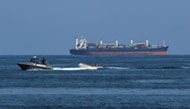There is no question that trade can disrupt lives. But while trade can hurt some workers, most economists believe it plays a modest role compared with other forces in the economy, including advances in technology, the decline of trade unions and the outrageously high salaries for executives. Many Americans benefit from freer trade, whether they are buying cheaper imports or exporting products.
Consider the four million manufacturing jobs lost over the last decade. That number is daunting - and the human pain behind it very real. But in most years the United States generates more jobs than it loses.
Suppose the critics are right and all those workers were displaced by cheap imports and factories moving overseas. Those lost manufacturing jobs - an average of 400,000 a year - amount to less than 3 percent of the 15 million jobs lost each year across the economy. Meanwhile, about 17 million jobs were created annually, which is why the American unemployment rate at the end of 2007 was not much different than it was at the end of 1997.
What about pay- Critics say trade drives down all blue-collar wages, making it more difficult for companies that compete with cheap imports to increase pay while the greater competition for remaining jobs can lower wages.
But no matter how hard economists look for the impact of trade on these inequities, they find it plays only a bit part. Josh Bivens of the Economic Policy Institute estimated that rising trade with poor countries increased wage inequality between college and high school graduates by about 7 percent over the past quarter-century - but the wage gap has widened by more than six times that amount over that period. And many economists think Mr. Bivens overstates trade’s impact. Robert Lawrence of Harvard University concluded that the increase in wage inequality since the 1990s had little to do with trade.
Trade’s critics overstate the threat of “cheap imports” from poor countries. Often these goods are just assembled in poor countries from components made in high-wage countries - including the United States. Moreover, many of the things imported from cheap labor markets have not been made here for a long time, so pose no threat to American goods.
So what is going on?
Economists have other explanations for the stagnation of middle incomes and the mushrooming income gap. Lawrence Katz, a Harvard economist, argues that a big part of the problem is a shortage of educated, skilled workers at a time when demand for them keeps rising. High school graduation rates are flat, and there has been a slowdown in the growth of college graduation rates, partly because of the rising cost of college. This is weighing on wages of less-educated workers while increasing the pay of the most educated.
Outrageous executive pay and excesses in financial markets also play a big part. The richest 1 percent of the population has captured more than half of the nation’s total income growth since 1993.
None of this denies that American workers are hurting. But blaming trade is not the right way to go. What the presidential candidates need to do is respect the voters, and explain the economics and outline policies that will address the true problems.
That means expanding the social safety net to help workers displaced by trade. The United States government also has to invest more in education to help produce better-prepared, better- paid graduates. To help American companies compete, it must invest in better roads and ports and address the country’s health care crisis. And it must move toward more progressive taxation to help redistribute the spoils of growth.
The candidates also need to remind workers of trade’s benefits. Trade gives companies and consumers access to cheap imports and accelerates the spread of new technologies; exporters gain access to foreign markets; foreign competition spurs innovation. According to economists at the Peterson Institute for International Economics, increased trade since World War II has added about 10 percent to American national income.
Blaming Nafta and other trade agreements for American workers’ pain may play well on the campaign trail. But it will not solve the country’s economic problems. It will only make them worse
스마터리빙
more [ 건강]
[ 건강]이제 혈관 건강도 챙기자!
[현대해운]우리 눈에 보이지 않기 때문에 혈관 건강을 챙기는 것은 결코 쉽지 않은데요. 여러분은 혈관 건강을 유지하기 위해 어떤 노력을 하시나요?
 [ 건강]
[ 건강]내 몸이 건강해지는 과일궁합
 [ 라이프]
[ 라이프]벌레야 물럿거라! 천연 해충제 만들기
 [ 건강]
[ 건강]혈압 낮추는데 좋은 식품
[현대해운]혈관 건강은 주로 노화가 진행되면서 지켜야 할 문제라고 인식되어 왔습니다. 최근 생활 패턴과 식생활의 변화로 혈관의 노화 진행이 빨라지고
사람·사람들
more
“취미생활로 다진 친목… 선후배들과 만든 모교사랑”
사진러브한인 사진 동호회 사진러브(회장 크리스 고)는 13일 용수산에서 송년모임을 갖고 한 해를 마무리하는 뜻깊은 시간을 가졌다. 이날 모임에…

[홀인원] 이상원 박사
일반외과 전문의 이상원(왼쪽) 박사가 지난 9일 뉴포트비치 소재 골프장 9번 홀(152야드)에서 레스큐 클럽으로 친 샷이 그대로 홀에 빨려 들…
[송년행사 게시판] 재미시인협회
재미시인협회(회장 지성심)는 오는 20일 오후 4시 가든스윗호텔에서 한 해를 마무리하며 동인지 ‘외지’ 제35집 출판 기념회와 ‘제23회 재미…
[송년행사 게시판] 향군단체 연합
6.25 참전유공자회와 대한민국 육군협회 등 남가주 지역 향군 단체 연합은 19일 오전 11시30분, 용궁에서 송년 행사를 개최한다. 드레스코…
[송년행사 화보] “이웃과 함께 나누고 지인과 함…
KYCC13일 윌튼 플레이스 초등학교에서 열린 ‘한인타운청소년회관(KYCC) 홀리데이 카니발’이 성황리에 막을 내렸다. 올해는 KYCC 창립 …
많이 본 기사
- 밴스에 줄선 찰리 커크의 ‘마가 제국’…차기 대선후보 띄우기
- 간단한 혈액검사로 알츠하이머를 예측할 수 있을까
- 미국인 5명중 1명만 “트럼프 덕에 살림살이 나아졌다”
- “수십년 된 약물이 알츠하이머병 뇌세포 사멸·인지 저하 완화”
- “올해 미국서 AI 사유로 일자리 5만5천개 사라져”
- 내란전담재판부법 국회 본회의 상정…여야 필버 거쳐 내일 표결
- 사흘간 우크라전 종전협상… “건설적” 美 평가에도 돌파구 글쎄
- ‘통일교 특검’ 출범 초읽기…與, 지지층 여론·野 압박에 수용
- 월가 전문가 “관세 여파 美물가 급등 충격 없을 것”
- 與 “여야 정치인 예외 없는 통일교 특검 수용”…국힘 “환영”
- 특검, ‘김건희 집사’ 김예성에 징역 8년 구형… “죄질 불량”
- ‘얼리 디시전’ 합격 후 포기?… 불이익 따를 수도
- 워싱턴 ‘개선문’·백악관서 UFC…트럼프의 건국 250주년 구상
- 이스라엘, “공격표적 된다” 서방 체류 유대인들에 귀국 권고
- 삼성·SK, 트럼프의 ‘對中 AI 주도권 확보’ 구상 참여 의사
- [이민법 칼럼] 이민법 221(g)에 따른 비자 거부
- ‘엡스타인 망령’ 못떨치는 트럼프…트럼프 가린 파일공개 파장
- 美, 베네수엘라 근해서 유조선 또 추적중…3번째 나포 가능성
- 스페이스X 로켓 폭발에 근처 여객기들 ‘아찔’…항공안전 우려
- 한국계 NASA 우주비행사 조니 김 “우주서 김치·밥 그리웠다”
- 엡스타인 파일 공개 다음날 트럼프 사진 삭제…야당서 탄핵 경고
- 30년 만에 의문의 비극…과 동기에 피살 ‘승승장구’ MIT 교수
- “응급환자 골든타임 놓칠 일 없어요”… 한국 ‘의료 AI’ 50% 성장
- 이금희, 이상형으로 ‘혼외자 논란’ 정우성 꼽자..서장훈 “눈 낮으시네요” 일침
- 법무副장관 “피해자보호위해 엡스타인파일서 트럼프사진 삭제”
- 공수처 지휘부 재판 오늘 시작… ‘강등’ 정유미 집행정지 심문
- 샌프란 정전 대부분 복구…웨이모 로보택시는 일시 중단
- BTS “새앨범 녹음 끝나…2026년은 방탄소년단의 해”
- 맘다니 승리 이끈 ‘감당 가능 생활비’, 내년 선거 화두 급부상
- 김주하, 이혼사 최초 고백 “ ‘불륜’ 전 남편에 맞아 고막 파열..목 졸린 적도”
- 위즈덤트리 플래너건 “美 경기침체 징후 없어”
- 한러, 모스크바서 비공개 북핵 협의…러 “韓과 논의 없어” 부인
- 백악관 “인플레, 목표치보다 낮아…금리 인하 여지 충분”
- ‘최초+최초+최고’ 안세영, ‘허벅지 내리치는 투혼’→왕중왕전도 석권... ‘11회 우승’ 역대 최초 상금 100만 달러 돌파
- 젤렌스키 “美와 종전논의 ‘건설적’…유럽과 추가협의 필요”
- “노는 것도 지겨워” 박미선, 유방암 투병 중 ‘SNS 공구’ 갑론을박
- 판례 잘못 인용해 머스크 손들어준 판사… “AI 쓰다 오류” 의혹
- ‘매관매직’ 尹부부 금주 동반 재판행…특검, 최종 법리 검토
- BTS 정국과 열애설 후 첫 SNS..에스파 윈터, 커플 타투는 가렸다
- ‘反트럼프’ 공화 큰손, 작년 대선에만 약 5억4천800만달러 썼다
- ‘열애설→결별설 겪은’ 제니·지드래곤, 단둘이 ‘MMA’ 대상 쓸어갔다
- 엡스타인파일 공개 후폭풍…법무부 ‘트… 2
- [건강포커스] “밤에 더 자주 깨는 어르신, 다음 날 인지수행 능력 떨어져”
- 내란전담재판부법 오늘 본회의 상정…여야 필리버스터 격돌
- ‘韓 EPL 센터백 탄생하나’ 국가대표 이한범, 에버턴 관심 현지 보도
- ‘새댁’ 함은정, 결혼식 하자마자..내조의 여왕
- ‘이젠 SD 송성문’ 3루엔 ‘3억 5000만 달러’ 마차도 버티는데... 단장이 답했다 “다양한 역할 소화할 것”
- 안세영, ‘천적’ 야마구치도 넘었다…역대 최다승까지 단 한 걸음
- 백악관 “인플레, 목표치보다 낮아…금리 더 일찍 내렸어야”
- 엡스타인 파일 공개 다음날 트럼프 사진 삭제…야당서 탄핵 경고
1/5지식톡

-
 ☝️해외에서도 가능한 한국어 선생님…
0
☝️해외에서도 가능한 한국어 선생님…
0이 영상 하나면 충분합니다!♥️상담신청문의♥️☝️ 문의 폭주로 '선착순 상담'만 진행합니다.☎️ : 02-6213-9094✨카카오톡ID : @GOODEDU77 (@골뱅이 꼭 붙여주셔야합니다…
-
 테슬라 자동차 시트커버 장착
0
테슬라 자동차 시트커버 장착
0테슬라 시트커버, 사놓고 아직 못 씌우셨죠?장착이 생각보다 쉽지 않습니다.20년 경력 전문가에게 맡기세요 — 깔끔하고 딱 맞게 장착해드립니다!장착비용:앞좌석: $40뒷좌석: $60앞·뒷좌석 …
-
 식당용 부탄가스
0
식당용 부탄가스
0식당용 부탄가스 홀세일 합니다 로스앤젤레스 다운타운 픽업 가능 안녕 하세요?강아지 & 고양이 모든 애완동물 / 반려동물 식품 & 모든 애완동물/반려동물 관련 제품들 전문적으로 홀세일/취급하는 회사 입니다 100% …
-
 ACSL 국제 컴퓨터 과학 대회, …
0
ACSL 국제 컴퓨터 과학 대회, …
0웹사이트 : www.eduspot.co.kr 카카오톡 상담하기 : https://pf.kakao.com/_BEQWxb블로그 : https://blog.naver.com/eduspotmain안녕하세요, 에듀스팟입니다…
-
 바디프렌드 안마의자 창고 리퍼브 세…
0
바디프렌드 안마의자 창고 리퍼브 세…
0거의 새제품급 리퍼브 안마의자 대방출 한다고 합니다!8월 23일(토)…24일(일) 단 이틀!특가 판매가Famille: $500 ~ $1,000Falcon: $1,500 ~ $2,500픽업 & 배송직접 픽업 가능LA…
케이타운 1번가
오늘의 1면
오피니언
 한영일 / 서울경제 논설위원
한영일 / 서울경제 논설위원[만화경] 웰다잉 인센티브
 캐슬린 파커 워싱턴포스트 칼럼니스트
캐슬린 파커 워싱턴포스트 칼럼니스트 [캐슬린 파커 칼럼] 아이들을 온라인에서 보호하기
 양상훈 수필가ㆍ시인
양상훈 수필가ㆍ시인 [한국춘추] 경제대공황ㆍ제2차 세계대전 승리로 극복한 루스벨트 리더쉽

[왈가 왈부] 고환율에 외환 건전성 완화·서학개미 규제… 미봉책 아닌가요
 수잔 최 한미가정상담소 이사장 가정법 전문 변호사
수잔 최 한미가정상담소 이사장 가정법 전문 변호사 [수잔 최 변호사의 LIFE &] AI 시대 편리함에 안주하지 말자
 김도년 성균관대 건축학과 교수 스마트도시·건축학회장
김도년 성균관대 건축학과 교수 스마트도시·건축학회장 [로터리] 지멘스가 만드는 미래 동네
1/3지사별 뉴스

퀸즈장로교회 ‘사랑의 바구니’130개 이웃에 전달
퀸즈장로교회가 18일 크리스마스를 앞두고 교인들의 정성과 사랑이 듬뿍 담긴 ‘사랑의 바구니’ 130개를 소방서와 경찰서, 요양원, 선교회, 그…
시민권 박탈 착수⋯매달 200명

“이웃 돌보는 여러분이 동역자”
워싱턴성광교회(담임목사 임용우)는 18일 한인단체와 소방서‧도서관 등에 총 2만9천 달러의 성금을 전달했다. 지난 2011년부터 15년째 지역…
소기업 지원에 1천만 달러 투자

백악관 “인플레, 목표치보다 낮아…금리 더 일찍 내렸어야”
케빈 해싯 백악관 국가경제위원회(NEC) 위원장은 21일 중앙은행인 연방준비제도(Fed·연준)가 “금리를 더 일찍 내렸어야 했다”고 말했다.해…
엡스타인 파일 공개 다음날 트럼프 사진 삭제…야당서 탄핵 경고

오늘 하루 이 창 열지 않음 닫기 




















































.png)


댓글 안에 당신의 성숙함도 담아 주세요.
'오늘의 한마디'는 기사에 대하여 자신의 생각을 말하고 남의 생각을 들으며 서로 다양한 의견을 나누는 공간입니다. 그러나 간혹 불건전한 내용을 올리시는 분들이 계셔서 건전한 인터넷문화 정착을 위해 아래와 같은 운영원칙을 적용합니다.
자체 모니터링을 통해 아래에 해당하는 내용이 포함된 댓글이 발견되면 예고없이 삭제 조치를 하겠습니다.
불건전한 댓글을 올리거나, 이름에 비속어 및 상대방의 불쾌감을 주는 단어를 사용, 유명인 또는 특정 일반인을 사칭하는 경우 이용에 대한 차단 제재를 받을 수 있습니다. 차단될 경우, 일주일간 댓글을 달수 없게 됩니다.
명예훼손, 개인정보 유출, 욕설 등 법률에 위반되는 댓글은 관계 법령에 의거 민형사상 처벌을 받을 수 있으니 이용에 주의를 부탁드립니다.
Close
x